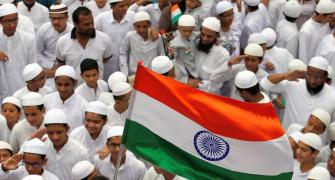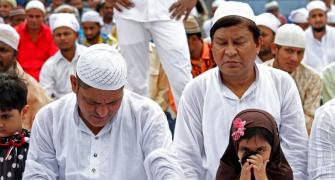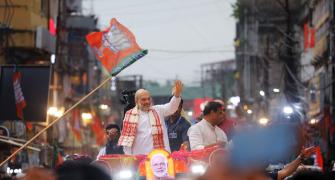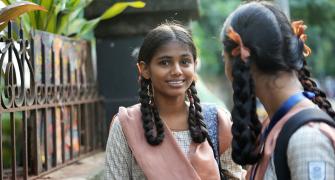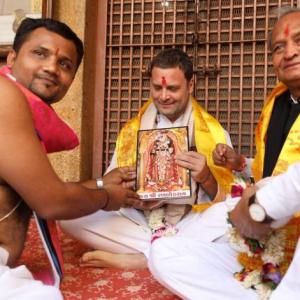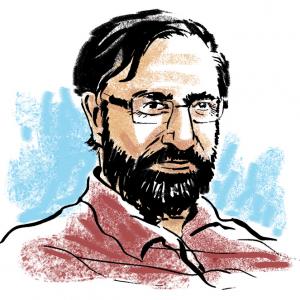The Deen Bachao, Desh Bachao conference in Patna on April 15 was attended by lakhs of Muslims.
Will the electoral dividends from this rally be reaped by Nitish Kumar, the BJP (through Hindu consolidation), by both Nitish and the BJP or will it be reaped more by the anti-BJP forces, asks Mohammad Sajjad.

One of the most appropriate definitions of communalism in modern India is given to us by a scholar freedom-fighter, Kunwar Mohammad Ashraf (1903-1962), in his Urdu book on Muslim politics. He called it mazhab ki siyasi dukandari (political trade in religion).
Has it really been proved true, yet again?
Agitating against the Bharatiya Janata Party government's Bill on Muslim women's rights proposed in the Lok Sabha on December 15, 2017, the Muslim clergy has been mobilising Bihar Muslim women since February.
This culminated in a massive rally, 'Deen Bachao, Desh Bachao (save religion, save the country) conference', which was attended by lakhs in Patna's Gandhi Maidan on April 15.
Interestingly, while the Ulema were protesting against legislative interference in their religion, the All India Muslim Personal Law Board, a respondent in the Supreme Court, had submitted an affidavit that only legislative interference could be allowed into such matters.
In other words, the legislative interference was asked for by the AIMPLB.
The apex court delivered its verdict on August 22, 2017, invalidating instant triple divorce (talaq-e-biddat), as it is un-Quranic.
The bill proposes, inter alia, to criminalise this practice.
The lead in this protest was taken by the Imarat-e-Shariah, with its leader, Wali Rahmani, also the general secretary of the AIMPLB, in the forefront.
Sections of Muslims were already wary of the mobilisation without preparing a model nikahnama and without a draft bill to be debated in Parliament, or not even a categorical stand against the un-Quranic instant triple divorce.
That Hindutva groups which were on the rampage on the pretext of beef, targeting and lynching Muslims with beards, skull caps, etc, and in the midst of intermittent communal violence across Bihar from January to March this year, have, at the same time, been allowing Muslim women to come out on the streets in district towns -- had begun to create suspicions if it was a fixed match between the Ulema and the saffron establishment.
Against this backdrop, on April 15, the massively attended Deen Bachao rally quite predictably did attract a lot of attention.
Days before, hoardings with photographs of Bihar Chief Minister Nitish Kumar were issued by ruling Janata Dal-United functionaries. This corroborated the conjecture among sections of Muslims that the rally was basically intended to help right-wing Hindu consolidation.
The organisers of the rally did not issue any clarification as to whether the ruling dispensation had done so against their wishes.
This was not all, there was other corroboration too:
- The venue was flooded with hoardings advertising the Nitish Kumar government's schemes for Muslims and other minorities.
- The speech delivered by Maulana Rahmani profusely thanked the chief minister for 'all kinds of helps extended to make the rally a grand success.'
- The speakers did not say a word against the anti-Muslim violence, since January, across Bihar.
- The convenor of the rally, Khalid Anwar, was nominated by the JD-U, an NDA constituent, into the legislative council after the rally.
This is now being taken, even by the hitherto aqeedatmand (unquestioning followers) of the Imarat, and apologists of the rally, as evidence of a nexus between the NDA and the Imarat-e-Shariah.
Even though the Imarat, in a letter dated April 17, tried to clarify that Anwar's nomination was not recommended by it, many take this more as a confirmation, and ask why he was the convenor of the rally.
Nor have the Imarat's Ulema condemned its convenor joining the NDA.
Some dismayed Urdu journalists have written letters to Maulana Rahmani, asking him, through social media, to explain and clarify the accusations of this 'deal'.
Some of these articulations speculate that a Nitish Kumar-led 'third front', comprising Ram Vilas Paswan, Pappu Yadav, etc, will be floated to make a dent into 'secular' votes, and also to split the Muslim votes, thereby facilitating the BJP's victory in Bihar; and that having befooled Muslims, the 'third front' will subsequently re-join the NDA.
Another speculation is that with this move, Nitish may enhance his bargaining power within the NDA.
On April 17, there was a protest in front of the Imarat office in Phulwarisharif, Patna, where an effigy of Maulana Rahmani was burnt.
Bihar's Muslims have flooded social media with such questions, sparking off intense debate. It is also speculated that since Nitish Kumar lacks the numerous core base of voters, he may not have deserted the Mahagathbandhan in July 2017 without prior consultation with the vote-wielding body of the Imarat-e-Shariah, and that the Idara-e-Shariah may have been lured to get along in the name of Islam in danger.
Patna's Idara-e-Shariah is a body of the Barelvi sub-sect, founded in 1968 by Arshadul Qadri (1925-2002).
Thousand of buses were hired to carry the Muslims attending the rally.
Who bore the expenses? Was it also contributed by the ruling JD-U?
Another set of questions arising out of it is over the lives of the dramatis personae behind the rally: Maulana Rahmani, Khalid Anwar, and Obaidullah Azmi.
For about two decades consecutively, Obaidullah Azmi was a member of the Rajya Sabha. His controversial speeches in the 1980s across Bihar-Bengal in some ways rivalled Imam Bukhari.
Cassettes of his speeches were banned, yet sections of Muslim youth listened to these, in defiance, for which some of them faced charges of threatening national security, and were put behind bars.
One wonders, why did Rahmani draw him out of political oblivion and have him adorn the dais?
Khalid Anwar's home turf Dhaka (in East Champaran) is a communally sensitive constituency.
It has a history of having elected Muslim legislators even in the pre-Lalu Yadav era as well as of electing BJP legislators even in an era when the BJP was a marginal force in Bihar. It has a huge residential Salafi madrasa funded by Saudi Arabia.

The Imarat-e-Shariah was founded in Patna in 1921, under the aegis of Maulana Azad (1888-1958). It remained consistent in opposing British rule as well as the communal separatism of the Muslim League.
In September 1936, it launched its political outfit, the Muslim Independent Party, which mainly had agrarian concerns, besides safeguarding the religio-cultural concerns of Muslims.
During April-July 1937, it ran its ministry after which the Congress took over.
During those four months of administration, headed by a Britain-educated barrister, Mohammad Yunus (1884-1952) it earned laurels on the front of irrigation, flood control, soft loans to peasantry, firm handling of communal violence, etc, besides the construction of the legislative house in Patna.
Essentially Deoband oriented, in recent decades, the Imarat-e-Shariah has confined itself to religio-cultural concerns, though its influential members have invariably been getting into the legislature as well.
In 1986, they mobilised Muslims against the Supreme Court verdict over the issue of maintenance to Shah Bano, and succeeded in making the State legislate against the judicial verdict.
The 1980s was a decade of competitive communalism in India, and the clergy gained a lot of electoral importance.
It now appears that the Ulema intends to regain its political significance, which it feels has been losing in recent years.
Its electoral irrelevance was most glaring in the Bihar assembly election in 2015 when the Nitish-Lalu alliance reduced the election to bipolarity, with clearly drawn lines.
In such a scenario, faced with the majoritarian BJP, the other pole took them, and their constituency, for granted.
Now, it is said, the Ulema would be in a position to bargain with the two contenders for Muslim votes -- Lalu and Nitish.
In fact, the accusation is post-July 2017, when Nitish rejoined the NDA, he is being made a contender for Muslim votes. However, given the fact that Rahmani is also an All India Congress Committee member, his alleged pro-JD-U tilt is rather surprising.
Meanwhile, Anisur Rahman Qasmi of the Imarat-e-Shariah is reported to have suggested on April 17, partly responding to a volley of angry questions, that the rally was intended to enhance Muslim share of representation, from panchayat to Parliament.
Also, to be noted here is the shifting objective of the rally: From retaining the un-Quranic instant triple divorce, it now moves on to enhancing Muslim representation.
Qasmi, on April 13 (two days before the rally), told United News of India that the rally would be 'purely non-political', yet it turned out to be absolutely political.
With these rather fast-paced developments, the Bihar space has become much more interesting for election-watchers.
Forces opposed to the majoritarian aggression of the incumbent regime, and also those associated with the RJD, both contemplate to expose what they call the 'Mulla-Nitish nexus', and thereby prevent any split in non-saffron votes in the 2019 election.
It remains to be seen who the electoral dividends from this rally will be reaped by: Nitish, the BJP (through Hindu consolidation), by both Nitish and the BJP or will it be reaped more by anti-BJP forces.
Professor Mohammad Sajjad is at the Centre of Advanced Study in History, Aligarh Muslim University.
He has published two books: Muslim Politics in Bihar: Changing Contours(Routledge, 2014/2018 reprint). and Contesting Colonialism and Separatism: Muslims of Muzaffarpur since 1857 (Primus, 2014).

